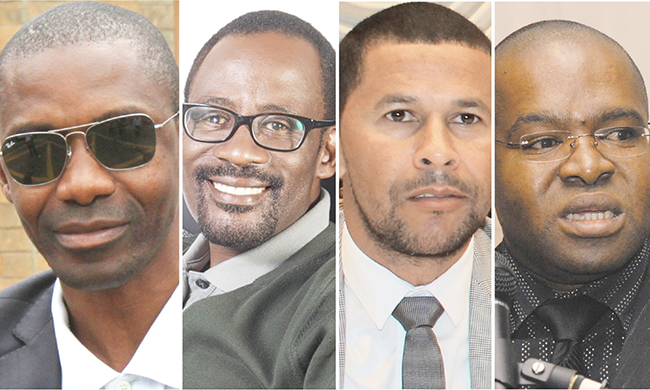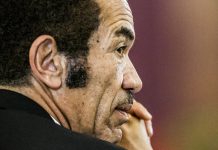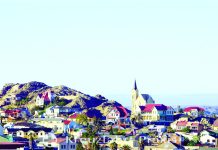By Shinovene Immanuel | 15 August 2014
THE enrichment of Namibia’s tiny elite of politically connected middlemen is set to continue, as government applauds multimillion-dollar deals that have made a handful of individuals fabulously wealthy through the sale of petroleum licences.
Namibia is yet to strike oil in commercial quantities but it is being called the next big oil frontier, whose offshore geological formations are like those of Brazil, where the giant Lula field was discovered in 2006.
Licences for oil in Namibia are acquired by well-placed individuals for a fee of between N$15 000 to N$30 000 and later sold for millions of dollars to international companies.
Calculations show that a cartel involving not more than 20 middlemen and politicians have benefited in the past six years from fewer than 10 transactions involving cash or shares in exchange for their prospecting licences.
Many beneficiaries are politicians, their children or their close business partners. The absence of regulation on such transactions allows room for the sale of licences.
The public disclosure of transactions would almost certainly reveal crony enrichment on a far larger scale.
It also means that despite the government policy of favouring locals when issuing licences, Namibians are losing the grip on the ownership of oil blocks.
Ninety per cent of the 90 oil-block licences issued are now held by international companies.
The list of licence-holders provided by government last week shows that locals only own an average of between 5% and 10% in each oil block compared to eight years ago, when they owned most of them.
Some companies have announced the sale of their licences but have refused to reveal the price, saying this is confidential.
Anglo-Dutch group Shell, for example, acquired a 90% stake in two blocks owned by Signet Petroleum, a company owned by a Malaysian company Mettiz Capital through London-listed Polo Resources. Mettiz Capital is owned by Shanghai-born businessman Michael Tang.
Shell did not divulge the amount it had paid for the block, saying it was a confidential transaction. However, investor watch website proactiveinvestors.co.uk quoted Tang as saying that the deal was worth R220 million.
Apart from the transfer licence fee of N$30 000, the Namibian government did not receive a cent from the transaction in taxes.
Mines and energy minister Isak Katali admitted in 2011 that Namibia has become an “El Dorado of speculators and other quick-fix, would-be mineral explorers and mining developers”.
A report released by the Institute for Public Policy Research (IPPR) last year, “Namibia’s new frontiers – transparency and accountability in extractive industry exploration”, echoed claims of underhand deals in the exploration sector, and a worrying trend of pressure by government officials on foreign firms to link up with inexperienced, hand-picked local partners.
The report was also concerned about the influence of politically connected middlemen. It said that companies are asked to make empowerment deals with other companies that appeared to be little more than “briefcase firms” representing one or two favoured individuals.
IPPR also complained of the lack of laws, rules and guidelines dealing with conflicts of interest in the exploration industry.
Its director Graham Hopwood said it was a major concern that Namibia’s public officials – elected politicians and state employees – were not required to declare their assets.
“The failure to tackle these issues in law, systems and practice creates major loopholes which can be exploited by corrupt officials and business people,” he told amaBhungane.
He also said it is possible for a company to receive a licence and sell it in a multimillion-dollar deal without the fact ever being publicised.
“We do not know about the companies that senior public officials may have links to, because there are no working systems for public asset declaration in Namibia and information about companies at the registrar of companies often appears to be incomplete, missing and/or out of date,” he said.
“We can’t demand this information because government is under no compulsion to make it public – Namibia lacks an access to information law – and so much of it remains off limits or only partially released”.
Hopwood expressed concern that licences are allocated by a small group of officials under a non-statutory committee headed by a petroleum commissioner who has massive influence over the final decision.
The government decided to issue licences on a first-come, first-served basis in 2006.
The licences are cheap, entitling holders to conduct a preliminary exploration on an area to determine where prospecting should be focused. A “reconnaissance licence” costs N$15 000.
To apply for a full exploration licence, making the systematic prospecting for oil and gas deposits possible, a payment of N$30 000 is required. A 25-year production licence, allowing the holder to extract petroleum within a specific production area, also costs a mere N$30 000.
Namibians with a small stake in a licence block could be in line for a huge cash payout if a company sells out or reduces the size of its stake.
The petroleum commissioner, Immanuel Mulunga, said: “We are obliged to process every application that we receive, regardless of whether the applicant is, as you put it, well connected or not”.
“I can personally only be happy and proud to be overseeing an industry where Namibians have profited. What’s the point of doing business if you can’t make money from it?”
amaBhungane has compiled a list of the principal beneficiaries, who all have links with the government or the ruling party, Swapo.
Knowledge Katti
Businessman Katti is a friend of prime minister Hage Geingob, the probable next president of Namibia, and a business partner of liberation struggle stalwart Andimba Toivo ya Toivo.
Katti started getting oil licences in 2006 when the Namibian government decided to give preferential treatment to black-owned companies. The then minister of mines Erkki Nghimtina said Katti, in partnership with South African businessman Mxolisi Mbetse, had been awarded an exploration licence for three blocks.
Katti led two Namibian empowerment companies, Cumoxi Investments and Knowledge Resources, which owned 30% of the company awarded the rights, Mbetse’s Namibian Industrial Development Group (NIDG).
The same year Katti brought Namibian home affairs minister Iivula-Ithana into his other company, Kunene Energy, which received licences for three blocks off the Namibian coast measuring more than 10 000 square kilometres.
Katti sold Kunene Energy to Canadian-listed UNX Energy Corp in 2008. UNX described him in a media statement as “well positioned to assemble strategic interests in high-profile African oil and gas projects”.
The deal consisted of cash and shares in UNX. Also in 2008, UNX purchased Katti’s 30% of NIDG for US$1,5-million in cash.
In 2011, Brazilian oil company HRT bought UNX Energy Corp for $781-million (about R5-billion at that time) in a shares-only deal.
Katti and his partners, including minister Iivula-Ithana, are believed to have owned about 12% of UNX Energy at the time, giving them a paper windfall of around US$90-million.
HRT is now the second largest licence-holder in offshore Namibia, with ten blocks.
Iivula-Ithana declared the 15% interest she has held in Kunene Energy since 2006 to parliament.
She complained earlier this year in parliament that Namibia gets ‘scraps’ from natural resource deals. Her son Shafa Kaulinge’s company, Amis Energy, also holds three exploration licences.
Katti refused to answer detailed questions emailed to him. “Go to the government and ask them to respond to every concern you have. I have little time to entertain childishness or any nonsense,” he said.
Heinrich Ndume
Another well-connected individual who has made a fortune from the sale of licences is “Swapo” Ndume, son-in-law of Namibian President Hifikepunye Pohamba.
Ndume is the director of Enigma Oil and Gas Exploration, a company that was bought by London-listed Chariot Oil and Gas in 2008 in a deal that valued Enigma at $47-million.
Alongside Katti’s companies, Ndume’s Enigma was one of the first black-owned oil concerns to secure licences.
According to its 2009 annual report, Chariot had licences covering 10 blocks, mostly acquired with Ndume’s assistance.
Chariot now controls close to 13 blocks, making it Namibia’s biggest offshore concession owner.
However, the two wells so far drilled by Chariot have been dry.
Desmond Amunyela and Lazarus Jacobs
Amunyela and Jacobs, co-owners of Paragon Investment Holdings have benefited from the sale of a licence covering 17. 295 square kilometres in the Walvis Basin.
Two years after acquiring it, Paragon sold its interest to Pancontinental Oil & Gas for US$4-million (N$40-million) last year.
Paragon’s interest in the block was reduced to 5%, while the Australian company’s stake increased to 95%.
Amunyela was unapologetic about selling the stake, saying this had been done to raise money for their other investments and branding the transaction “smart enterprising”.
Paragon is a private equity and management company with interests in property, marketing, extractive industry and media – including the weekly Windhoek Observer newspaper.
The Observer lobbied for the election of prime minister Hage Geingob as Swapo’s vice-president at the party’s 2012 congress, qualified him to be the next head of state.
Amunyela said his ties with Geingob date back as far as 1994. He again defended his relationship with the premier in July this year after admitting that he paid R1-million for Geingob’s trip to the 2014 World Cup final in Brazil.
Ironically, the paper has questioned the relationship between businessmen – whom it does not name – and government officials.
Paragon has bagged several government contracts, such as a duty-free shop at Namibia’s international airport.
Amunyela told AmaBhungane last week that there is nothing wrong with Namibians selling their licences, as oil is a natural resource that belongs to them.
“The truth is many of us do not have the expertise and skill to develop a mine or drill for oil. Partnerships with those in the know is good for Namibia to learn from,” he added.
Amunyela criticised politicians, saying some of them make “silly statements because they are out of depth with the portfolios they occupy and want to divert from their failures.
“Government officials should not make damaging statements at the expense of other Namibians who are only trying to make a living within the ambit of the law,” he said
Family and comrades
Other licence-holders who are politically powerful, or are linked by family or friendship to those in power, include:
• Helmut Angula, a Swapo politiburo member served as a minister or deputy minister in five portfolios (1990 and 2010) and headed the National Planning Commission. He is a director of Eco Atlantic and Eco Atlantic Namibia – the third-largest international company with rights over Namibian’s sea with an interest in nine oil blocks. His daughter, Phillipine Angula, runs Eco Namibia.
• Tobie Aupindi, vice-president of Hydrocarb Namibia, the local subsidiary of US-based multinational Hydrocarb Energy. Aupindi is a former Swapo think tank member, advising on party policies.
• Frans Mushimba, son of BEE mogul Aaron Mushimba, who is the brother-in-law of former president Sam Nujoma. Frans also has a joint venture with BP and Canada’s Serica Energy.
• Dantagob Gurirab, the son of National Assembly Speaker and former Prime Minister Theo-Ben Gurirab. He co-owns Alphapetro, a former partner of Canada’s Petro Viking Energy. The licence they jointly held expired last year and has not been renewed..
* Shinovene Immanuel is currently an intern at Mail & Guardian’s investigative arm amaBhugane






